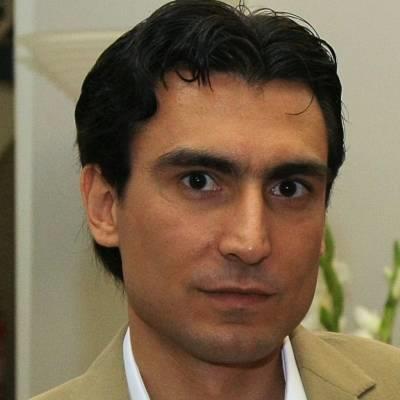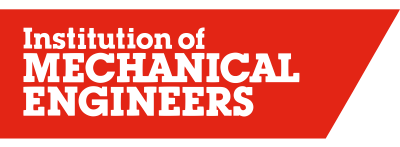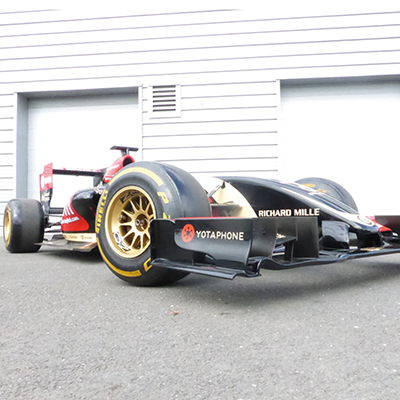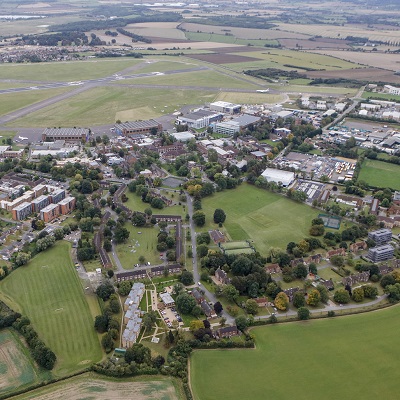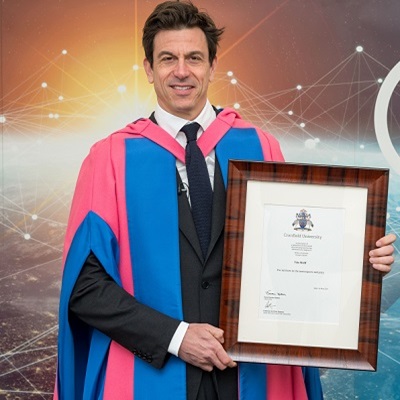The Advanced Motorsport Mechatronics MSc has a limited number of places, due to its popularity early application is encouraged.
We pride ourselves in supporting our graduates to find high quality employment in their chosen field. As such, we annually showcase our students' CVs to our industry partners, giving students the opportunity to be discovered by potential employers. CVs of our class of 2025 can be downloaded here.
Overview
- Start dateSeptember
- DurationOne year full-time
- DeliveryTaught modules 40%, Group project 20%, Individual project 40%
- QualificationMSc
- Study typeFull-time
- CampusCranfield campus
Who is it for?
This course aims to provide students with a sound understanding of the fundamental scientific, engineering and managerial principles involved in motorsport. A combination of mechanics, electronics and computer systems, this postgraduate programme prepares graduates for a career in motorsport or high performance engineering.
For those students wishing to apply with a pure science or pure mathematics background or those with limited motorsport experience we strongly recommend our Introduction to Motorsport Engineering short course as a primer for the MSc programme.
Why this course?
Cranfield University has undertaken research, consultancy and testing for the motorsport sector since the 1970s. The University is home to the FIA approved Cranfield Impact Centre and Cranfield Motorsport Simulation which work with F1 and leading motorsport companies.
The MSc in Advanced Motorsports Mechatronics aims to provide you with a sound understanding of the fundamental scientific, engineering and managerial principles involved in motorsport, and their implementation within a high performance technology context. You will cover design, testing and operation of competition vehicles, and related aspects of control engineering, computer modelling, embedded systems, alongside vehicle dynamics, vehicle systems, and management techniques related to motorsport. You will be taught the skills required for the planning, execution and reporting of motorsport projects and to prepare them for a variety of roles in motorsport.
We have an international reputation for our expertise in aerodynamics, CFD, materials technology, including composites, safety of motorsport vehicle structures, power-train development, vehicle dynamics, simulation, data acquisition and electronics, tyre characterisation and modelling. This track record ensures the course is highly respected by the motorsport industry.
As a student, you will benefit from:
- Practical sessions using Cranfield's facilities and equipment
- Engagement with motorsport practitioners
- Motorsport related project work.
Informed by Industry
The course content is informed by industry, by means of our engagement with members of the Cranfield University Motorsport MSc Steering Committee. We are delighted to have an active advisory board containing senior members of the worldwide motorsport industry to advise on course content and connect regularly with students and staff.
| Paul Crofts | Helix Powertrain - Chief Technologist-Process and Vertical Integration |
| Chris Aylett | The Motorsport Industry Association - Chief Executive |
| Professor Pat Symonds | F1 - Chief Technical Officer |
| Owen Carless | Red Bull Powertrains - Head of Mechanical Simulation |
| Sylvain Filippi | Envision Racing - Managing Director & CTO |
| Ron Hartvelt | One Group Engineering - Managing Director |
| Stefan Strahnz | Mercedes AMG Petronas F1 - Chief Engineer Cost and Commercial Programmes |
| Christopher Tate | Mission Motorsport - Chairman |
| Neil Spalding | Signa Performance, Moto GP Journalist |
| John Proctor | AVL UK - Technical and Operations Director |
| David Lapworth | Prodrive - R&D Director |
| Gérry Hughes | KW Special Projects - CTO |
| Cristiana Pace | E-novation Consulting - Founder |
| Mike Pilbeam | Pilbeam Racing Designs |
| John Ryan | Motorsport UK - Safety & Technical Director |
| Ian Goddard | BWT Alpine F1 - Head of Technical & Innovation Partnerships |
| Isaac Sanchez | Ferrari - F1 Innovation & Special Projects Manager |
| Dennis de Munck | Ferrari - Head of Employer Branding and University Relations |
| Pete James | Lyra Electronics - Founder & Director |
| Stuart Robertson | FIA - Head of Circuit and Rally Safety |
| Peter Digby | BRDC - Chairman |
| John Grant | BRDC |
Course details
The MSc course consists of nine one-week taught modules, a motorsport mechatronics group design project and an individual thesis project.
Course delivery
Taught modules 40%, Group project 20%, Individual project 40%
Race Vehicle Design and Race Engineering, Group Design Project
The purpose of the Race Vehicle Design and Race Engineering, Group Design Project is to allow each you to demonstrate your team working ability in relation to a motorsport relevant area and to communicate their innovative ideas, analysis and conclusions in both written and oral formats. The group design project develops your resource management skills and improves their business literacy. Individual reflection in relation to their contribution, competencies and peer review complements these areas of personal development. In addition, each student reflects on the economic, legal, social, and environmental context of the group design project.
The annual group design project is supervised by member/s of academic staff. You are expected to hold and actively participate in regular group meetings (at least once a week), producing meeting minutes that include a rating of individual team member’s contribution for the week and attend two formative reviews by the academic panel. You will be asked to follow-up on the panel’s feedback. At the end of the project, each group of students is required to write a project report. There will also be an oral examination of your presentation of your group work.
The group report should be no more than 10,000 words (body text) with all students in the group contributing to the report’s concision and precision. As a group you are required to produce a poster, although this is not assessed. Likewise, the data files you submit will not be assessed. Again, non-assessed, as part of your Cranfield learning experience you will present your work, including poster, at the group design project presentation day. Individually you are assessed on both your individual contribution throughout the group design project and the delivery of a reflective review report that will take into consideration your personal evaluation of your competencies and how these developed during the group design project and the peer review exercise.
Regarding the latter element, you will attend a formative feedback meeting with a member, or members, of the academic team around the mid-point of the group design project. In terms of the individual evaluation, you will then focus on two areas of improvement for the remaining period of the group design project, reflecting on these and your own individual contribution in your written report at the conclusion of the group design project phase. Within the individual report, you will reflect on the economic, legal, social and environmental context of the group design project.
Individual project
The purpose of the individual project is to allow you to demonstrate your independent learning ability and interest in advancing their knowledge through the pursuit of independent research and/or development work in an industrially relevant area and to communicate their ideas, analysis and conclusions in written and oral formats.
The subject of the thesis is agreed between the student and the academic team. Topics will normally relate to one or more elements of the taught modules with regards to a motorsport engineering or mechatronics technical issue.
On occasion, Cranfield theses have formed the basis of technical articles published in journals such as Racecar Engineering. Below is an example of a fully autonomous small-scale vehicle developed by one of our students in collaboration with a local motorsport company.
Modules
Keeping our courses up-to-date and current requires constant innovation and change. The modules we offer reflect the needs of business and industry and the research interests of our staff and, as a result, may change or be withdrawn due to research developments, legislation changes or for a variety of other reasons. Changes may also be designed to improve the student learning experience or to respond to feedback from students, external examiners, accreditation bodies and industrial advisory panels.
To give you a taster, we have listed the compulsory and elective (where applicable) modules which are currently affiliated with this course. All modules are indicative only, and may be subject to change for your year of entry.
Course modules
Compulsory modules
All the modules in the following list need to be taken as part of this course.
Motorsport Introduction
| Aim |
|
|---|---|
| Syllabus |
|
| Intended learning outcomes |
On successful completion of this module you will be able to:
|
Motorsport Powertrains
| Module Leader |
|
|---|---|
| Aim |
|
| Syllabus |
|
| Intended learning outcomes |
On successful completion of this module you should be able to:
|
Motorsport Electronics and Data Acquisition
| Aim |
|
|---|---|
| Syllabus |
|
| Intended learning outcomes |
On successful completion of this module you will be able to:
|
Motorsport Vehicle Dynamics
| Module Leader |
|
|---|---|
| Aim |
|
| Syllabus |
|
| Intended learning outcomes |
On successful completion of this module you will be able to:
|
The Business of Motorsport
| Aim |
|
|---|---|
| Syllabus |
|
| Intended learning outcomes |
On successful completion of this module you will be able to:
|
Mechatronics Modelling for Vehicle Systems
| Module Leader |
|
|---|---|
| Aim |
|
| Syllabus |
|
| Intended learning outcomes |
On successful completion of this module you should be able to:
|
Advanced Control and Optimisation
| Module Leader |
|
|---|---|
| Aim |
|
| Syllabus |
The module will provide knowledge in advanced control design tools and techniques and advance analytical methods in designing multivariable controllers with applications in the automotive engineering area. The theory of the multivariable controls will be introduced and then their use will be illustrated and developed by example applications. The theory and applications will be interleaved with selected associated topics (listed below) as appropriate through the module. The material will be addressed theoretically and practically: all lecture-based teaching will be supported by practical exercises using MATLAB and Simulink. Prior to the start of the module, you are expected to have reached a high standard of expertise in advanced classical control and the use of MATLAB and Simulink for control system design. As a guideline, you should have met the intended learning outcomes for the module ‘Automotive Control and Simulation’ before commencing this course. Students who have not taken this module should ensure they do sufficient pre-work prior to the module. Modelling multivariable systems:
Using time-based optimisation in multivariable control:
State estimator design:
Using norm-based optimisation to design robust controllers:
Reference conditioning using prefilters and two degree-of-freedom compensators (covered in outline only). Students will be provided with electronic copies of lecture slides, the lecturer’s handwritten notes and computer programs. Students are expected to complement this with their own notes. Recordings of the lectures will not be generally available for this module, though exceptions may be made for students who are unable to attend due to exceptional circumstances that are relevant, unexpected and external. |
| Intended learning outcomes |
On successful completion of this module you should be able to:
|
Embedded Vehicle Control Systems
| Module Leader |
|
|---|---|
| Aim |
Within the context of modern automotive control system, the aim of this module is for you to critically evaluate the different technologies and methods required for the efficient vehicle implementation, validation and verification of the automotive mechatronic system. |
| Syllabus |
Course content includes:
|
| Intended learning outcomes |
On successful completion of this module you should be able to:
|
Vehicle Control Applications
| Aim |
The aim of this module is to cover a range of applications of Control Theory and Artificial Intelligence techniques in different components of a modern vehicle including engines, electric motors, energy storage, steering, chassis, suspensions, advanced driver-assistance systems, etc. |
|---|---|
| Syllabus |
|
| Intended learning outcomes |
On successful completion of this module you should be able to:
|
Teaching team
The course director for this programme is Dr Kim Blackburn.
Accreditation
The Advanced Motorsport Mechatronics MSc is accredited by:
- The Institution of Mechanical Engineers (IMechE)
- Institution of Engineering and Technology (IET)
on behalf of the Engineering Council as meeting the requirements for further learning for registration as a Chartered Engineer (CEng).
Your career
Motorsport is a highly competitive sector. Studying at Cranfield will immerse you in a highly focused motorsport engineering learning experience, providing you with access to motorsport companies and practitioners. Our selectivity at course entry combined with world class teaching, facilities and industry networking, means that the great majority of our graduates go into motorsports roles upon course completion. In some instances, job offers are made even in the final months of the course.
Past graduates have taken roles such as:
- Braking Calibration Engineer
- Race engineer
- Motor Control Specialist
- Electrical and Controls Engineer
- CFD Engineer
- Systems Engineer
- Vehicle Dynamics Engineer
- Applications Lead Engineer
- Embedded Systems Specialist (Cyber Security)
- Applied Controls Engineer
- Vehicle Software Engineer
- Software System Engineer/Model Based Developer
- Simulation Engineer
- ADAS Systems Engineer
- Project Engineer for Electric & Hybrid Vehicles
Companies that employ our students include:
- Sauber Motorsport AG
- McLaren Automotive Ltd
- KTM AG
- Invicta Virtuosi Racing
- Honda Performance Development, Inc.
- General Dynamics Land Systems
- Cummins Inc.
- Bugatti Rimac
- AVL Powertrain UK Ltd
- AVANTIS GROUP
Successful students go on to be part of a global network of engineers and you will find Cranfield alumni working across motorsport and the high performance engineering sector.
Cranfield’s Career and Employability Service is dedicated to helping you meet your career aspirations. You will have access to career coaching and advice, CV development, interview practice, access to hundreds of available jobs via our Symplicity platform and opportunities to meet recruiting employers at our careers fairs. Our strong reputation and links with potential employers provide you with outstanding opportunities to secure interesting jobs and develop successful careers. Support continues after graduation and as a Cranfield alumnus, you have free life-long access to a range of career resources to help you continue your education and enhance your career.
How to apply
Click on the ‘Apply now’ button below to start your online application.
See our Application guide for information on our application process and entry requirements.
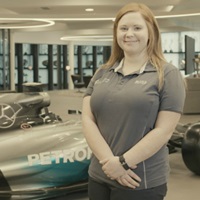
I feel that the MSc in Advanced Motorsport Engineering at Cranfield was an incredible experience I would not have been able to have anywhere else. I completed my thesis project with Mercedes AMG F1 which has further progressed into a full time job as a Test and Development Engineer.
Jessica Harris, Structural System Engineer
